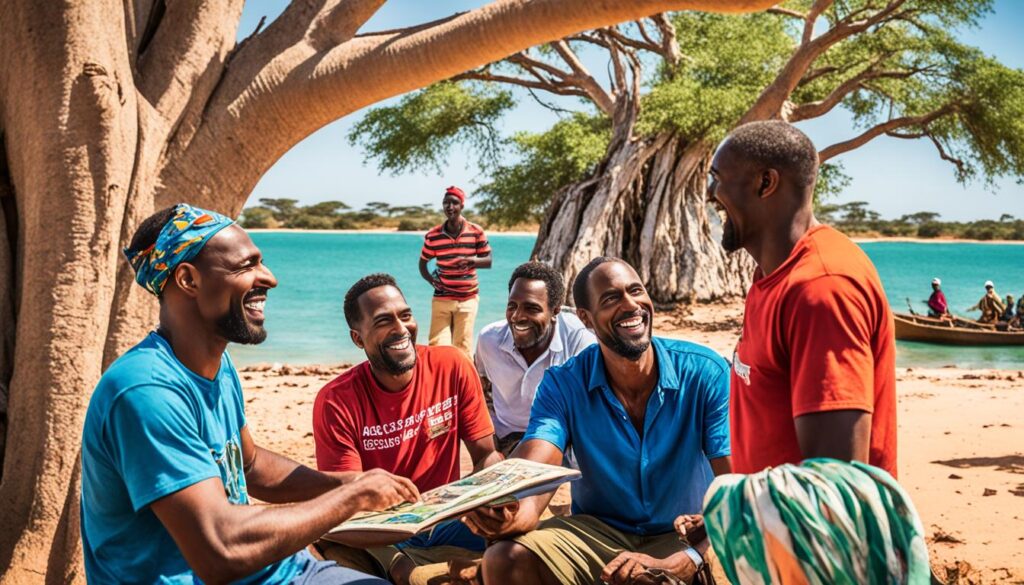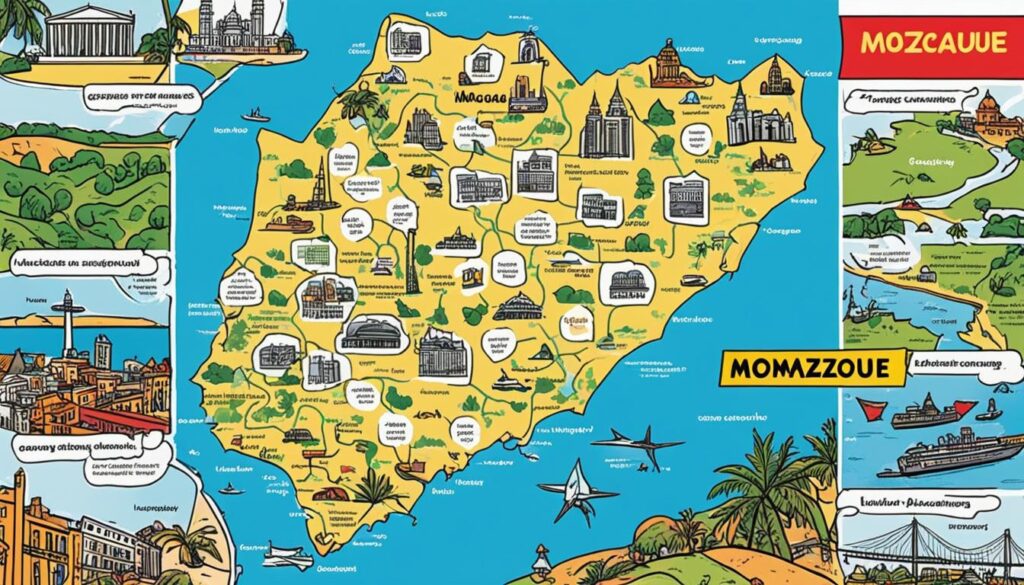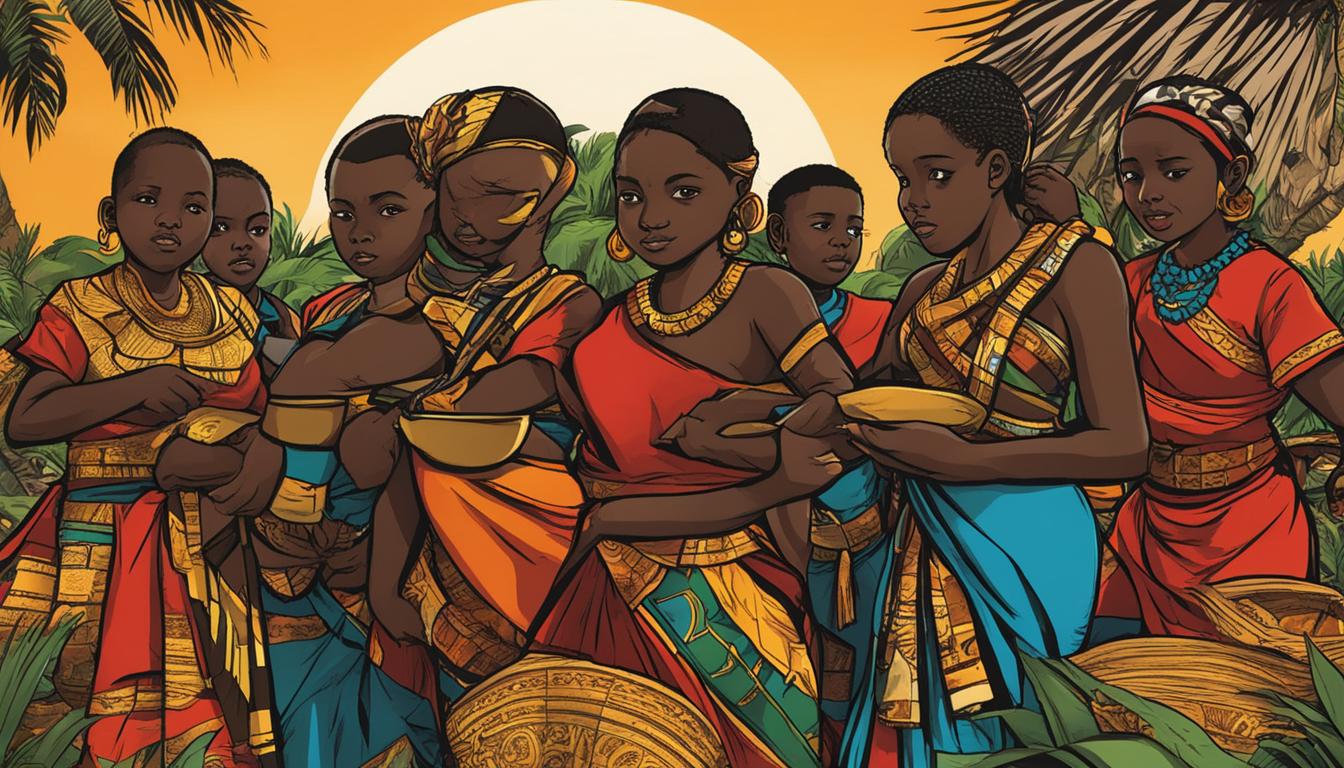Did you know that Swahili, also known as Kiswahili, is widely spoken in Mozambique, a country located in Southeast Africa?
This East African language has a rich cultural impact in Mozambique, where it is recognized as a minority language. Swahili is also one of the official languages of the East African Community, which includes Mozambique. It is primarily spoken in the coastal regions of the country, where it has been influenced by other local languages.
If you’re interested in learning more about Swahili, its words, translation, and the unique culture associated with it, keep reading to explore the fascinating world of the Swahili language in Mozambique!
The Origin and Classification of Swahili Language.
Swahili, or Kiswahili, is a fascinating language that originated from the Swahili people along the East African coast. It is classified within the Sabaki branch of the Bantu languages, which are part of the larger Niger-Congo language family. Swahili developed as a lingua franca in the region, serving as a means of communication and trade among various ethnic groups.
One of the defining characteristics of Swahili is its Arabic influence. Due to historical contact between Arab traders and the Bantu inhabitants of the coast, Swahili has incorporated around 15% of Arabic loanwords into its vocabulary. This unique fusion of Bantu and Arabic elements has contributed to Swahili’s rich linguistic heritage.
The Arabic influence on Swahili is not limited to vocabulary alone. It is also evident in the writing system of the language. Swahili can be written using both the Latin script and the Arabic script, providing flexibility and reflecting the cultural interchange that has shaped the language over the centuries.
The classification of Swahili within the Sabaki branch of the Bantu languages highlights its connection to other languages spoken along the Sabaki River, such as Pokomo and Giriama. This linguistic relationship showcases the common origins and shared features of these languages, despite their individual developments within different communities.
Swahili is a testament to the blending of cultures, as it carries the cultural heritage of both the Swahili people and the Arab traders who influenced its development. Its classification within the Sabaki branch of the Bantu languages is a reminder of its connection to other languages spoken along the Sabaki River.
In conclusion, the origin and classification of Swahili demonstrate the intricate interplay between different cultures and languages. The language has its roots in the Swahili people and has been shaped by the historical influence of Arab traders. Swahili’s classification within the Sabaki branch of the Bantu languages further emphasizes its connection to other languages in the region. With its unique blend of Bantu and Arabic elements, Swahili stands as a testament to the cultural diversity and linguistic richness of East Africa.
Swahili Language in Mozambique.
Swahili language holds a significant presence in the coastal regions of Mozambique, contributing to the linguistic diversity of the country. It is spoken by Swahili-speaking communities in various villages, including Naatthembo, Nakonya, and Likookha. Naatthembo, home to approximately 4,000 inhabitants, serves as the main center for Swahili speakers in Mozambique.
In addition to Naatthembo, Swahili is also spoken in Nakonya, a temporary settlement of huts located on the Sangage peninsula. The variant of Swahili spoken in Mogincual, known as enciinkwaare, is believed to be less influenced by other languages.
Swahili is one of the coastal languages of Mozambique that retains traces of the Swahili world, which once stretched from Somalia down to the southern part of Mozambique. It reflects the historical and cultural connections between the Swahili-speaking communities along the East African coast.

| Village | Population |
|---|---|
| Naatthembo | Approximately 4,000 inhabitants |
| Nakonya | Temporary settlement of huts on the Sangage peninsula |
Multilingualism in Mozambique.
Mozambique is a diverse and multilingual country, with a linguistic landscape that reflects its rich cultural heritage. The official language of Mozambique is Portuguese, which is spoken by over 50% of the population aged 5 and older, according to the 2007 national census.
However, Mozambique is also home to more than 20 indigenous languages, each with its own unique characteristics and cultural significance. These indigenous languages include Makhuwa, Sena, Tsonga, Lomwe, Shona, and Swahili, among others. They are spoken by various ethnic groups across the country, contributing to the linguistic diversity of Mozambique.
Many Mozambicans are bilingual or multilingual, speaking both their native language and Portuguese. This multilingualism is particularly evident in urban areas, where the use of Portuguese is more concentrated, while indigenous languages are more prevalent in rural communities.
Additionally, Mozambique is home to small communities of Arabs, Chinese, and Indians, who bring their own languages to the country. These diverse linguistic influences further contribute to the multilingual landscape of Mozambique.
| Official Language | Indigenous Languages | Other Languages |
|---|---|---|
| Portuguese | Makhuwa, Sena, Tsonga, Lomwe, Shona, Swahili, and more | Arabic, Chinese, Indian languages |
This table provides an overview of the languages spoken in Mozambique, highlighting the official language, the diverse range of indigenous languages, and other languages spoken within the country.
Despite Portuguese being the official language, efforts are being made to promote and preserve the indigenous languages of Mozambique. Recognizing the importance of these languages in preserving cultural heritage and fostering inclusivity, organizations and initiatives are working to document and revitalize indigenous languages, ensuring their continued presence and relevance in Mozambique.
Multilingualism in Mozambique is not only a reflection of the country’s history and cultural diversity but also an asset that enriches communication and fosters unity among its diverse population.
The Importance of Indigenous Languages
“Indigenous languages in Mozambique play a vital role in preserving cultural identity and promoting inclusivity among different ethnic groups.” – Dr. Maria Silva, Linguistics Professor
Language Geography and Influence among Languages in Mozambique.
In Mozambique, language distribution is shaped by geographical factors and historical influences. Different regions of the country have varying dominant languages, reflecting the linguistic diversity of Mozambique. The official language of Mozambique is Portuguese, which has had a significant influence on indigenous languages in the country.
One notable impact of Portuguese on indigenous languages is the presence of numerous loanwords. Over time, Portuguese words have been integrated into local languages, enriching their vocabulary and reflecting the historical interaction between Portuguese settlers and native speakers. This linguistic intermingling demonstrates the cultural fusion that characterizes Mozambique.
Language Groups in Mozambique
| Language Group | Major Languages |
|---|---|
| Emakhuwa | Emakhuwa, Echuwabo, Gitonga, Noki, Xironga |
| Xichangana | Xichangana, Ndzawu, Koti, Xikunda, Hitonga |
| Nyanja | Nyanja, Koti, Chichewa, Chewa, Senga |
| Cisena | Cisena, Macua, Maconde, Gitonga |
| Elomwe | Elomwe, Cindau, Gitonga, Kande |
| Echuwabo | Echuwabo, Cidawu, Gitonga, Chingova, Chindau |
The linguistic landscape of Mozambique reflects the country’s rich cultural heritage. While Portuguese serves as the official language, indigenous languages continue to thrive, preserving Mozambique’s diverse linguistic tapestry. As efforts are made to recognize and promote the importance of these indigenous languages, Mozambique stands as a testament to the power of language in shaping national identity.

Conclusion
In conclusion, the Swahili language plays a significant role in Mozambique, particularly in the coastal regions. As a Bantu language with influences from Arabic and other languages, Swahili enriches the linguistic diversity of Mozambique. It is spoken in various villages and communities, serving as a means of communication and cultural expression.
Despite the prominence of Swahili, Portuguese remains the official language of the country. However, there are ongoing efforts to promote and preserve indigenous languages alongside Portuguese. Recognizing the importance of language in shaping the country’s identity, Mozambique embraces multilingualism as a reflection of its rich cultural heritage.
Swahili’s heritage reflects the historical and cultural influences of Mozambique, with its roots in the East African coast. The language’s connection to other languages, such as Arabic, demonstrates the interplay of diverse cultural and linguistic traditions. Overall, the linguistic landscape of Mozambique is a testament to the country’s vibrant heritage and the value of language in fostering unity and understanding.
FAQ
What is Swahili?
Swahili, also known as Kiswahili, is a Bantu language spoken primarily in Tanzania, Kenya, and Mozambique. It is part of the Niger-Congo language family and belongs to the Sabaki branch.
What influences has Swahili had from other languages?
Swahili has a significant number of loanwords from Arabic, Portuguese, English, and German, due to historical contact with traders and settlers from these regions.
How did Swahili originate?
Swahili, or Kiswahili, originated as a Bantu language spoken by the Swahili people along the East African coast. It developed as a lingua franca in the region, facilitating trade and communication.
How is Swahili written?
Swahili can be written in both the Latin script and the Arabic script, with Arabic influence evident in its writing system.
Where is Swahili spoken in Mozambique?
Swahili is spoken in the coastal regions of Mozambique, particularly in villages such as Naatthembo, Nakonya, and Likookha.
How many languages are spoken in Mozambique?
Over 20 indigenous languages, including Makhuwa, Sena, Tsonga, Lomwe, Shona, and Swahili, are spoken in Mozambique alongside Portuguese, which is the official language.
What languages are spoken by communities in Mozambique?
Mozambique has small communities of Arabs, Chinese, and Indians who speak their own languages alongside Portuguese.
What is the linguistic landscape of Mozambique like?
The linguistic landscape of Mozambique reflects the diverse cultural and linguistic heritage of the country, with dominant languages varying across different regions.
